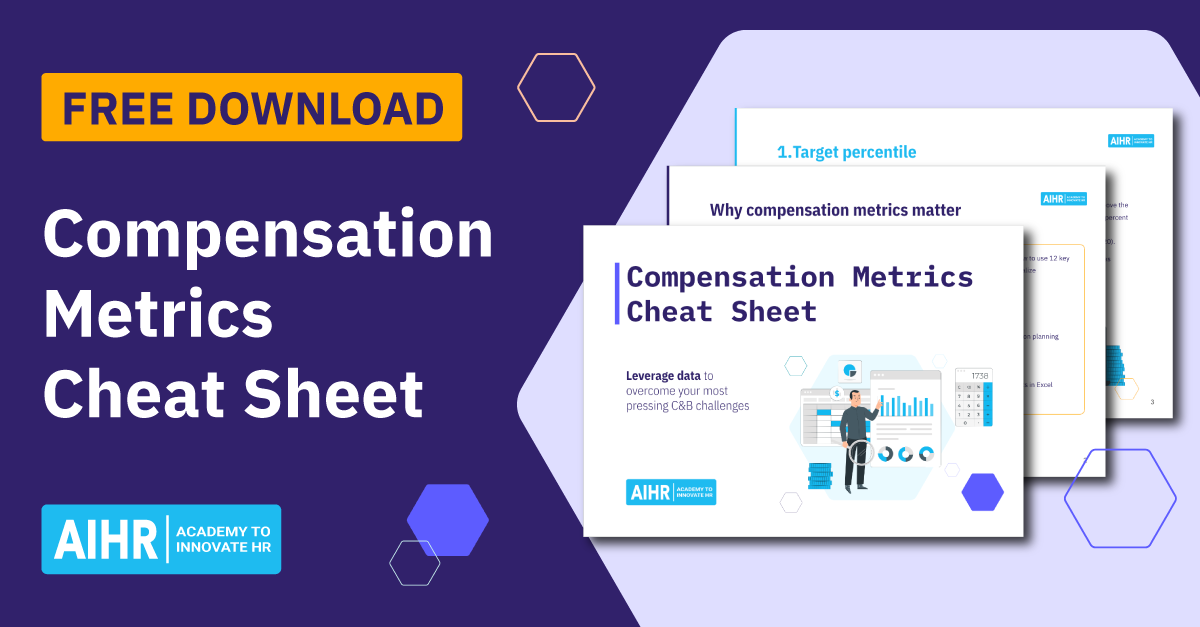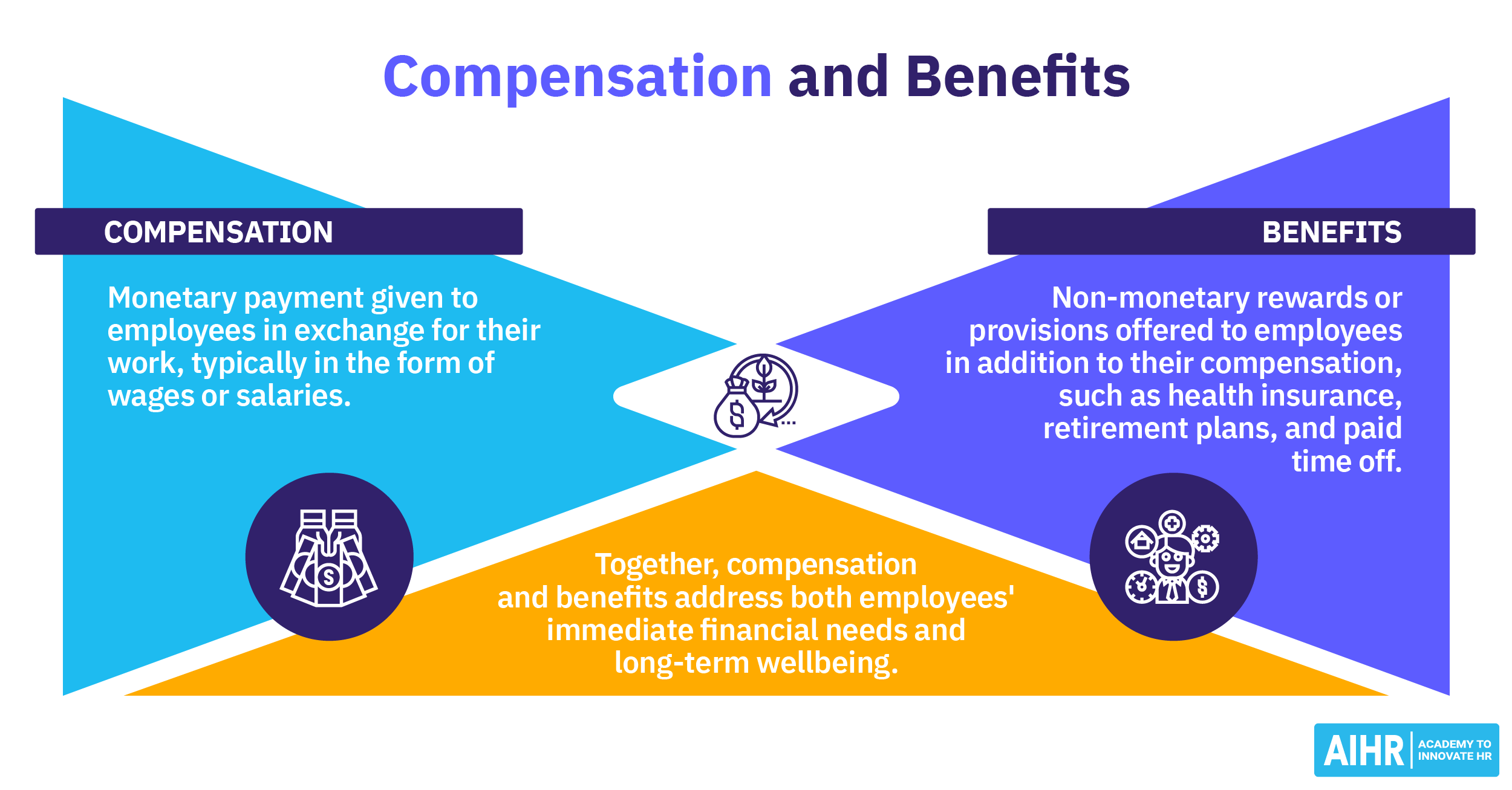Total Compensation
What is total compensation?
Total compensation refers to the complete package of direct and indirect rewards an employee receives from their employer. It covers direct monetary payments such as base salary, bonuses, and commissions, as well as indirect benefits like health insurance, retirement contributions, and other perks such as subsidized childcare.
What does total compensation include?
A total compensation package typically includes a mix of direct cash payments and indirect non-monetary benefits. For example:
Direct compensation
- Base salary/hourly rate: The fixed salary each employee receives for their work.
- Incentive pay: Additional cash compensation based on performance, target achievements, or company profitability (e.g., bonuses, profit sharing)
- Overtime pay: Payment for extra working hours, typically for time worked beyond the usual 40 hours per week.
Indirect compensation
- Insurance: Medical, dental, disability, and/or life insurance.
- Pay for time not worked: Sick days, vacation days, and public holidays are some common examples.
- Employee perks: Additional benefits such as gym memberships, low-cost or free meals, and subsidized childcare.

Why is total compensation important?
A clear breakdown of total annual compensation is a valuable HR tool for attracting, motivating, and retaining employees. When employees understand the full value of what they receive beyond their base salary — including bonuses, benefits, and equity — it can significantly enhance job satisfaction and employee morale.
Additionally, a well-structured total compensation plan is also a powerful recruitment tool. Candidates often weigh benefits and perks alongside salary when comparing job offers, making a competitive package a key factor in hiring top talent.
How to calculate total compensation
Calculating an employee’s total annual compensation is an essential HR practice. Here is a step-by-step guide:
- Step 1: Gather data on direct compensation: Direct compensation includes all monetary payments made directly to employees, such as:
- Base salary
- Bonuses (performance-based, company targets)
- Commissions
- Overtime pay (for salaried non-exempt employees)
- Step 2: Gather data on indirect compensation: Indirect compensation consists of non-monetary benefits that have monetary value, such as:
- Health insurance (medical, dental, vision)
- Paid time off (vacation, sick leave, public holidays)
- Stock options
- Retirement/pension plans
- Employee perks (commuter benefits, gym memberships, professional development)
- Step 3: Calculate: Add all direct and indirect compensation components to calculate the total compensation (see example below).
- Step 4: Review and adjust regularly: Assess your total compensation packages regularly to ensure they remain attractive and competitive within your industry. You should consider factors such as:
- Cost of living
- Job complexity
- Skills shortages
- Employee performance.
Benchmark your organization’s total compensation strategy against industry standards to ensure you meet employee expectations.
Did you know?
The U.S. Bureau of Labor Statistics reports that, on average, benefits—also known as non-salary compensation— make up about 30% of an employee’s total compensation.
Total compensation package example
Here is an example of a total compensation package for a Product Manager position:
Direct compensation
- Base salary: $120,000 annually.
- Performance-based bonus: Up to 10% of base salary, depending on individual and company performance ($12,000 bonus for exceeding financial targets).
Indirect compensation
- Insurance: Comprehensive health (no deductible, covers entire costs, estimated cost of $7,500) and dental (up to $2,000 per year).
- Paid time off: 20 paid vacation days, 10 sick days, up to 12 weeks of paid parental leave, and paid bereavement and jury duty leave. A monetary amount estimate could be $6,000.
- Stock options: Granted 1,000 stock options at a strike price of $45, vesting over four years (equivalent to $5,000).
- 401(K): 100% matching of employee contributions, up to 6% of salary (e.g., $7,200 per year).
- Employee perks: Commuter benefits (up to $100 per month), flexible working arrangements (up to two days of remote work per week), gym membership or wellness reimbursement (up to $600 per year), professional development opportunities (up to $3,000 per year). Total = $6,800 per year.
Total compensation package = direct compensation ($132,000) + monetary value of indirect compensation ($28,500) = $160,500.
Base salary vs. total compensation
There are some key differences between employees’ base salary and total compensation. For instance:
Definition
The fixed amount of money an employee earns before bonuses and benefits.
The complete package of pay and benefits an employee receives, including base salary, bonuses, and benefits.
Variability
Stable and does not fluctuate based on performance.
Can vary due to bonuses, stock options, and other incentives.
Taxes
Employee income is taxed.
Some aspects, like bonuses and profit sharing, are considered supplemental wages by the IRS and usually taxed (22% federal withholding rate).
How HR can ensure competitive total compensation
Here are ways HR professionals can ensure you are offering competitive total compensation to employees:
- Gather employee feedback: Conduct regular employee surveys and focus groups to understand employee satisfaction and total compensation expectations. This can help you fine-tune compensation offerings to match workforce needs.
- Make data your top priority: Regularly analyze industry salary surveys, compensation reports, and benchmarking studies to compare your organization’s pay and benefits with those of its competitors. Evaluate individual positions against their average market rates to help you understand current trends and set compensation structures aligned with market expectations.
- Offer a range of flexible benefits: To satisfy diverse workforce needs, provide optional additional benefits for employees to choose from. Consider the various financial goals, family structures, and age/life stages that might impact their benefit choices, ensuring they are varied but equitable.
- Communicate your total compensation plan: Provide a comprehensive overview of employees’ compensation, such as in a total compensation statement, benefits portal, or annual performance reviews. Be sure to keep employees informed of any notable changes.
- Review and adjust your total compensation strategy often: Make periodic adjustments to salary structures, incentives, and benefits to reflect changes in the labor market and business goals. Conducting annual or bi-annual reviews ensures your total compensation remains competitive over time.
HR tip
Personalizing a total compensation package can be a valuable recruitment and retention tool, especially for specialized and hard-to-fill positions. Utilize employee surveys, market research, and compensation reports to tailor total compensation for specific candidates and employee groups.
FAQ
A total compensation statement is a document that provides the complete value of an employee’s compensation package. It includes direct compensation such as salary, bonuses, and commissions, as well as indirect compensation like health insurance, paid time off, and employee perks. These statements are typically issued annually, but HR can also share them as part of an employment offer, or during performance reviews.
Base salary refers to the amount of money an employee earns for their work, such as hourly wages or annual salary. Total compensation encompasses the base salary, along with additional benefits and perks employees receive, such as:
· Health insurance (medical, dental, vision)
· Paid time off (vacation, sick leave, public holidays)
· Stock options
· Retirement/pension plans
· Employee perks (commuter benefits, gym memberships, professional development).
Total rewards include an employee’s total compensation but also cover additional elements that contribute to employee job satisfaction, such as professional development opportunities, employee recognition programs, social activities, and work-life balance.









